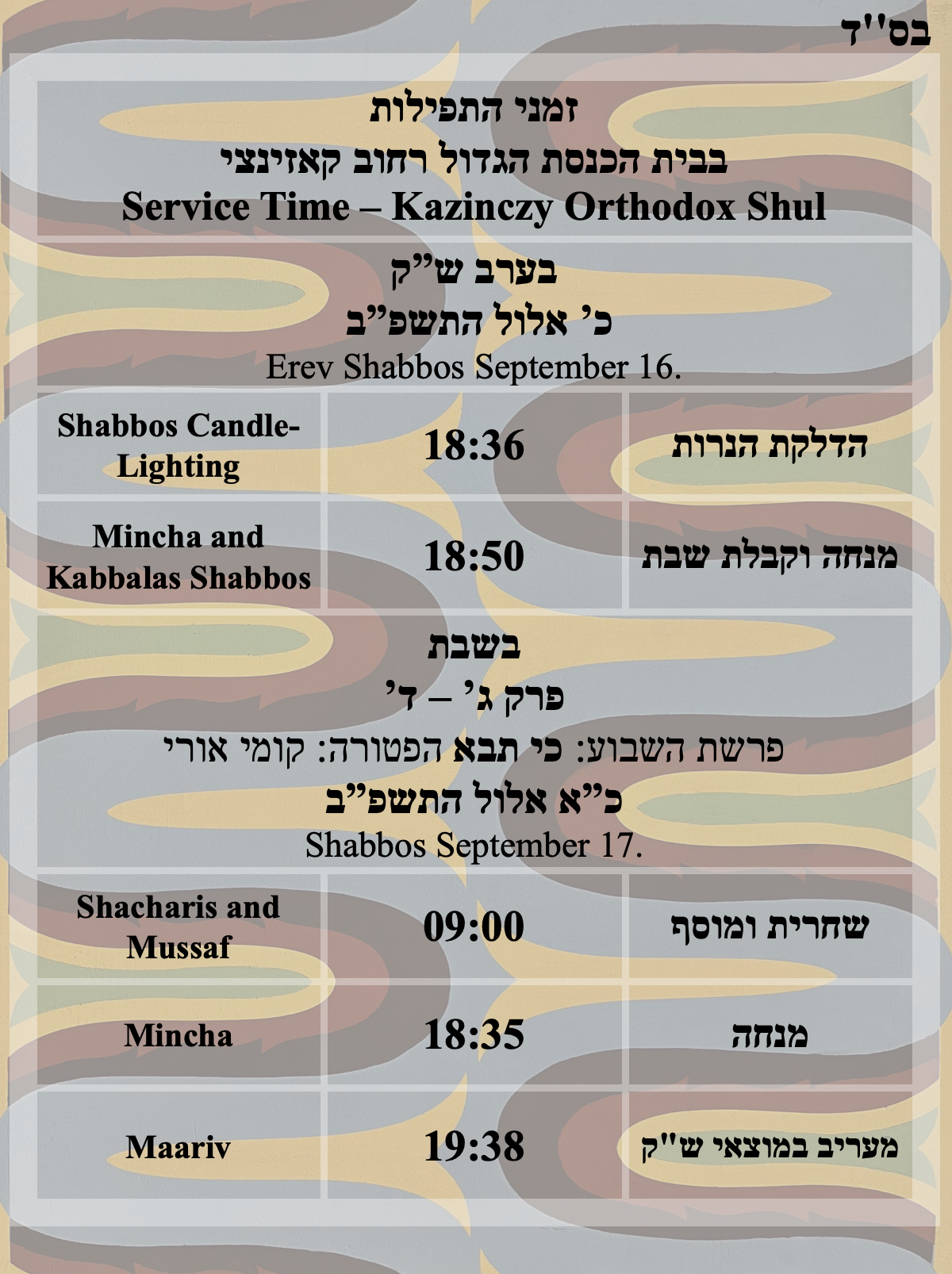Párását Ki Távó – Parashat Ki Tavo
Ki Távó
(5Mózes 26:1–29:8.)
„És lészen, midőn bemész az országba, melyet az Örökkévaló a te Istened ad neked birtokul és elfoglalod azt és laksz benne; akkor végy a föld mindazon gyümölcsének zsengéjéből, melyet betakarítsz országodban amelyet az Örökkévaló a te Istened neked ad […]” (5Mózes 26:1–2.) –Négy dolgot parancsol itt meg a Teremtő.
1. Tudd a szívedben, hogy nem az erőd és hatalmad által birtoklod az országot, hanem az „Örökkévaló adja neked birtokul”. Ráadásul úgy áll hogy az „Örökkévaló a te Istened” – azért adja, hogy vedd magadra királyságát.
2. „Elfoglalod azt” – még ha van is elég birtokod, akkor is kergesd el a Teremtő ellenségeit az országból.
3. „[…] és laksz benne” – külön micve Erec Jiszroélban lakni.
4. A zsengék felhozatala.
Még egyszer kihangsúlyozza a Tóra: „[…] amelyet az Örökkévaló a te Istened neked ad […]” – mert „hagy” a Teremtő magának is részt Erecben, ez pedig a hetedik, vagyis a Smita év. Úgy, ahogy áll: „[…] de a hetedik évben szombat nyugalma legyen az országnak, szombat az Örökkévalónak […]” (3Mózes 25:4.) Csak arra az évre parancsolja meg a zsengék felhozatalát, amit neked ad, vagyis az első hat évben, de a hetedik, Smita évben nem kell felhoznod, mert nem a tied, hanem gazdátlannak kell nyilvánítani (אור החיים).
„És elhozott bennünket ezen helyre és adta nekünk ezt az országot […]” (5Mózes 26:9.) – Fordítva kellett volna mondani hiszen először az országot adta nekünk a Teremtő, és csak utána jöttünk erre a helyre, ami a Szentélyt jelenti RáSI szerint. A Targum Jajneszn úgy magyarázza a poszukot: „[…] hogy vittelek benneteket sasszárnyakon és hoztalak benneteket én hozzám” (2Mózes 19:4.), hogy Peszách éjszakáján, amikor Izrael népe még Egyiptomban volt, az Örökkévaló felhőkön átvitte őket a Szentély hegyére, Jeruzsálembe, ott elfogyasztották a Peszách áldozatot, majd visszavitte őket Egyiptomba. Így már stimmel is a mondat, hiszen ezek szerint előbb voltak a Szentély helyén, mielőtt még megkapták volna Erec Jiszroélt. „És elhozott bennünket ezen helyre” – ez a Szentély, és utána kivonultunk Egyiptomból, „és adta nekünk ezt az országot” (זרע ברך פ׳ ויצא, עץ החיים).
Gut sábesz, Paskesz Zev

Parashat Ki Tavo
The curses and punishment that we are warned in our Parasha are a very serious nature.
“And it will be, if you do not obey the Lord, your God, to observe to fulfil all His commandments and statutes which I am commanding you this day, that all these curses will come upon you and overtake you. You shall be cursed in the city, and you shall be cursed in the field. Cursed will be your [food] basket and your kneading bowl. Cursed will be the fruit of your womb, the fruit of your soil, the fruit of your livestock, those born from your cattle and the flock of your sheep. You shall be cursed when you come, and you shall be cursed when you depart. The Lord will send the curse of shortages, confusion, and turmoil upon you, in every one of your endeavors which you undertake, until it destroys you and until you quickly vanish, because of your evil deeds in forsaking Me. […]” Many of them, to our horror, have come to pass.
The terrible sufferings that we have always been subjected to are spelled out here very clearly. It comes as some surprise, therefore to discover that the Torah attributes these punishment to our not enjoying ourselves enough. “Because you didn’t serve HaShem your God with joy and happy heart, from when you had an abundance of everything.”
Our verse tells us a profound message. Punishments to the Jewish people will be due to a life style in which we try to make everything quick and easy.
The proper path is to strive and work to put all our efforts into everything, and that is the real secret to true happiness. (Slifkin, Brea)
Shabbat Shalom, Paskesz Sharon

